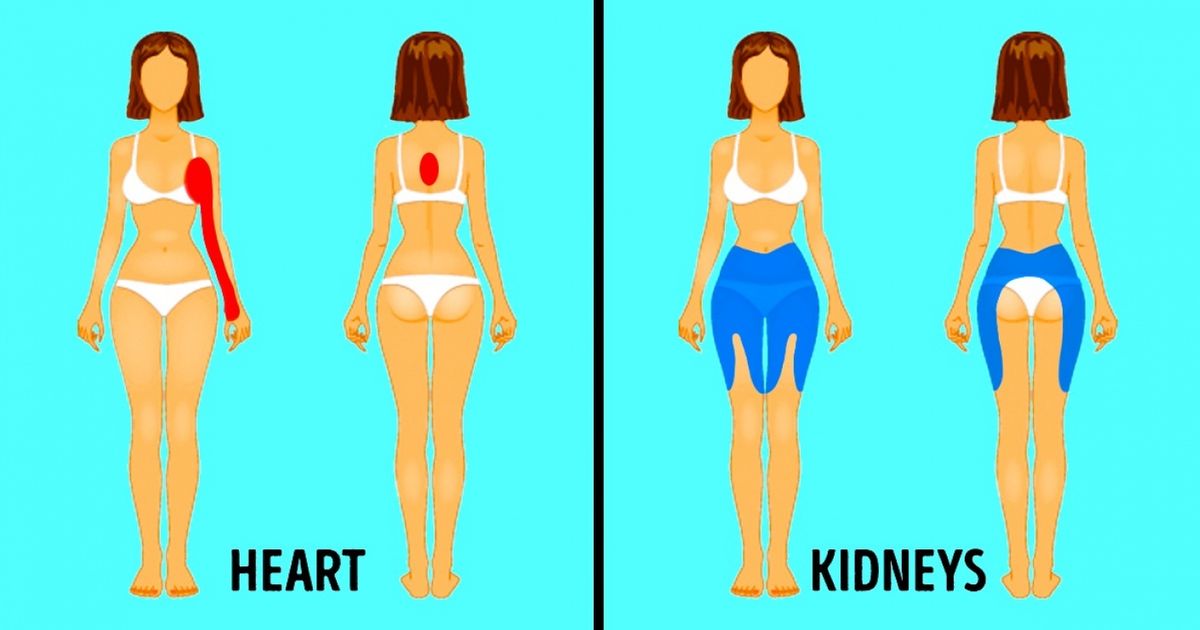In our busy lives, we often assume that our daily hygiene routines are flawless, yet many of us unknowingly engage in practices that may be more harmful than helpful. From our oral care habits to skincare routines and even the products we use for feminine hygiene, small missteps can have lasting effects on our health. In this comprehensive guide, we explore 6 hygienic mistakes we unknowingly tend to consider harmless. We’ll delve into each common mistake, explain the potential risks, and provide practical solutions and expert tips to help you optimize your self-care routine. Whether you’re interested in boosting your personal hygiene, improving your skin health, or enhancing your overall wellness, this article is packed with insights and actionable advice. For additional expert opinions, check out reputable sources like Mayo Clinic and Healthline.
Starting to Brush Your Teeth in the Same Place Every Time: Unnoticed Bacterial Hotspots
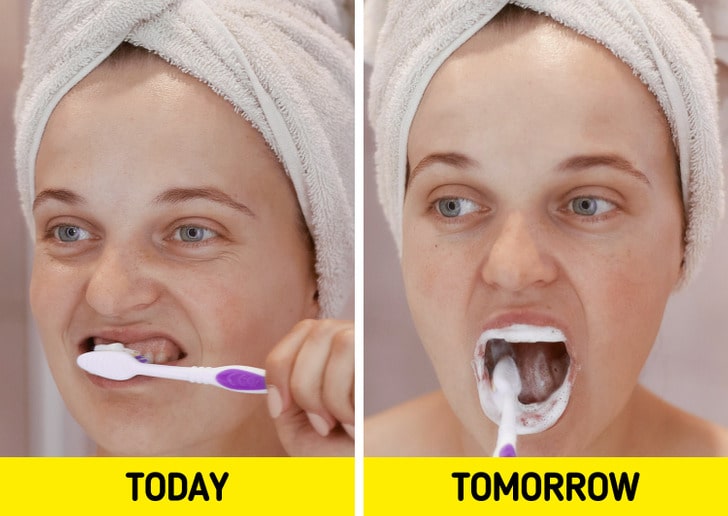
Many of us have a habit of starting our dental routine in the same spot—often a favorite corner of the sink or a specific position in front of the mirror. While this may seem trivial, it could lead to the buildup of bacteria in areas that are not effectively cleaned over time.
The Hidden Risks
- Bacterial Accumulation: Consistently using the same spot might lead to the accumulation of saliva and oral bacteria. Over time, these bacteria can multiply and contribute to dental plaque and gum disease.
- Cross-Contamination: If you store your toothbrush or dental tools in a fixed spot, especially if it’s close to the toilet or other contaminated surfaces, there’s an increased risk of cross-contamination.
How to Improve Your Oral Care Routine
- Rotate Your Toothbrush Placement: Consider changing the position of your toothbrush daily or weekly to minimize localized bacterial buildup.
- Regularly Disinfect Storage Areas: Clean your bathroom surfaces and toothbrush holders frequently with antibacterial solutions.
- Use UV Sanitizers: Invest in a UV toothbrush sanitizer to reduce the microbial load on your toothbrush, as recommended by Colgate.
By diversifying your brushing routine and maintaining a clean environment, you can protect your dental health and ensure your smile stays bright.
Washing Your Face After Exercise Instead of Before: A Hidden Skincare Mistake
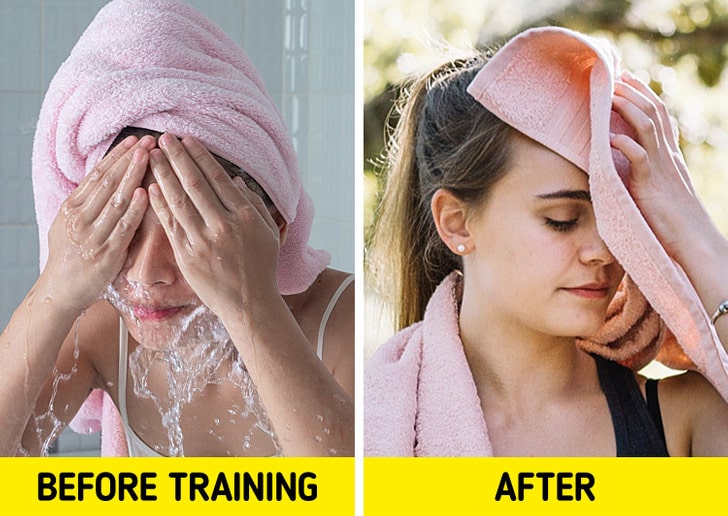
After a vigorous workout, many individuals rush to wash their face, thinking it will cleanse away the sweat and impurities. However, this common practice might not be as beneficial as you think.
The Impact on Skin Health
- Irritation from Impurities: When you wash your face immediately after physical activity, you might inadvertently irritate your skin. Sweat mixed with bacteria and environmental pollutants can cling to your pores, and hasty washing can spread these irritants further.
- Disruption of Natural Oils: Overwashing can strip the skin of its natural oils, leading to dryness, irritation, and potentially triggering acne breakouts.
Optimizing Your Post-Workout Skincare Routine
- Wait Before Washing: Allow your skin to cool down and your sweat to evaporate before washing your face. This helps your pores close naturally and minimizes irritation.
- Use a Gentle Cleanser: Opt for a mild, pH-balanced cleanser that won’t disrupt your skin’s natural barrier.
- Moisturize Wisely: Follow up with a lightweight moisturizer to restore hydration without clogging pores.
For more skincare tips after exercise, refer to advice from Dermstore and Healthline’s skincare guides.
Cutting Wet Nails: A Risky Hygiene Practice That May Invite Infections
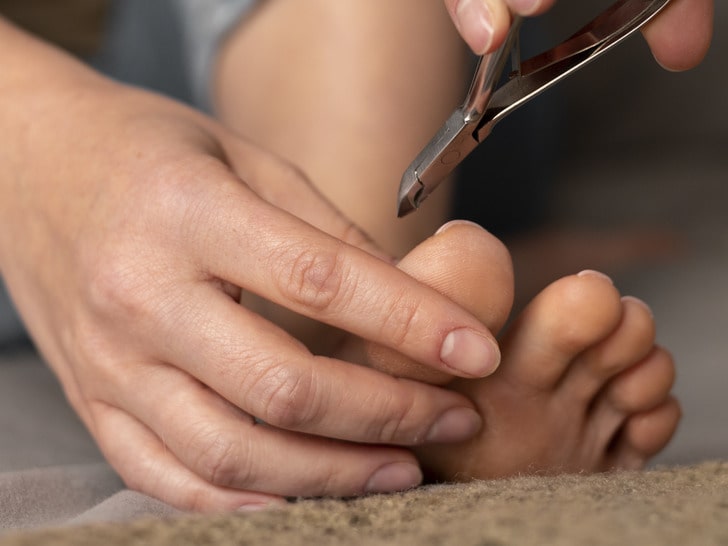
It might seem convenient to trim your nails while they’re still wet, especially after a shower, but this habit can actually be detrimental to nail health.
Why Wet Nail Cutting Can Be Harmful
- Weaker Nails: When nails are wet, they become softer and more prone to tearing or splitting. Cutting them in this state may lead to uneven edges and increased risk of infection.
- Increased Risk of Ingrown Nails: Wet nails are more flexible, and trimming them can sometimes result in improperly shaped edges, which can lead to painful ingrown nails over time.
Better Nail-Cutting Practices
- Dry Your Nails: Always wait for your nails to dry completely before trimming them. This allows them to harden slightly, making it easier to achieve a clean cut.
- Use Proper Tools: Invest in a high-quality nail clipper and file, and ensure they are sanitized regularly to prevent bacterial infections.
- Trim Regularly: Maintaining a consistent nail care routine can help prevent the development of ingrown nails and other complications.
For more on nail care and hygiene, consult resources from The American Academy of Dermatology.
Over-Reliance on Wet Wipes: Are They Really Effective for Personal Hygiene?
Wet wipes have become a staple in many households for quick clean-ups, but their convenience might come at a cost.
The Drawbacks of Relying on Wet Wipes
- Chemical Exposure: Many commercial wet wipes contain chemicals, preservatives, and fragrances that can irritate sensitive skin. Prolonged use may lead to allergic reactions or skin dryness.
- Environmental Impact: Most wet wipes are not biodegradable, contributing to environmental pollution and landfill waste.
- Incomplete Cleaning: While wet wipes can remove surface dirt, they may not effectively eliminate all bacteria, potentially leaving behind harmful pathogens.
Making Smart Choices with Wet Wipes
- Choose Natural Options: Look for wet wipes that are free from harsh chemicals and use natural, plant-based ingredients.
- Use Sparingly: Reserve wet wipes for situations where soap and water are not available, and avoid over-reliance on them for daily hygiene.
- Proper Disposal: Always dispose of wet wipes in the trash rather than flushing them down the toilet to prevent plumbing issues and environmental harm.
For more eco-friendly cleaning solutions and tips on maintaining skin health, check out resources from Environmental Working Group (EWG).
Over-Drying Your Body After Showering: How Excessive Towel Use Can Damage Your Skin
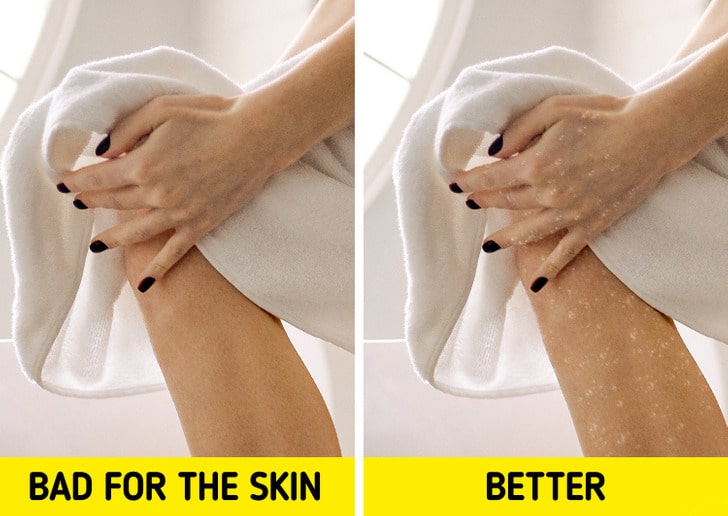
While it might seem that vigorously drying off after a shower is essential, over-drying your body can actually strip your skin of its natural moisture and lead to irritation.
The Problem With Over-Drying
- Loss of Natural Oils: Excessive drying can remove the natural oils that protect your skin, leading to dryness, itching, and potential flaking.
- Irritation and Sensitivity: Rubbing your skin too harshly with a towel can cause micro-abrasions, making your skin more susceptible to irritation and infections.
- Compromised Skin Barrier: A weakened skin barrier can lead to increased sensitivity to environmental pollutants and allergens.
Best Practices for Post-Shower Drying
- Pat Dry, Don’t Rub: Gently pat your skin with a soft towel instead of rubbing vigorously to preserve moisture and avoid irritation.
- Leave Some Moisture: Consider leaving your skin slightly damp and immediately applying a moisturizer to lock in hydration.
- Invest in Quality Towels: Choose towels made from soft, absorbent materials like organic cotton to minimize friction and irritation.
For additional tips on maintaining skin hydration and barrier function, explore information from Dermatology Times and Healthline’s skin care section.
Using Scented Pads and Tampons: The Hidden Dangers of Fragranced Feminine Products
Many women use scented pads and tampons to feel fresh and confident, but these products may contain chemicals that disrupt the natural balance of the vaginal environment.
Potential Health Risks
- Irritation and Allergies: Scented feminine products often contain dyes, fragrances, and chemicals that can cause irritation, allergic reactions, or contact dermatitis in sensitive individuals.
- Disruption of Natural pH Balance: The chemicals in scented products can disrupt the natural pH balance of the vagina, potentially leading to infections such as bacterial vaginosis or yeast infections.
- Long-Term Health Concerns: Continuous exposure to synthetic fragrances and chemicals may have unknown long-term effects on reproductive health.
Safer Alternatives for Feminine Hygiene
- Unscented Options: Opt for unscented, hypoallergenic pads and tampons that are designed to minimize irritation and maintain a healthy pH balance.
- Organic Products: Consider using organic or natural feminine hygiene products that are free from harsh chemicals and synthetic fragrances.
- Frequent Changes: Ensure that you change your pads or tampons frequently to maintain optimal hygiene and reduce the risk of irritation.
For more detailed information on safe feminine hygiene practices, consult resources from the Office on Women’s Health.
Conclusion: Elevate Your Hygiene Routine With Informed Choices
Our daily hygiene habits, though often taken for granted, play a crucial role in our overall health and well-being. Whether it’s the subtle nuances of our oral care routine, the way we handle our skincare and nail care, or the products we choose for personal use, each decision impacts our long-term health.
By rethinking common practices—such as where we start brushing our teeth, how we manage our post-workout skincare, or our reliance on chemical-laden products—we can make smarter choices that protect and enhance our health. Adopting these informed strategies not only minimizes risks but also fosters a more sustainable, eco-friendly, and effective approach to personal hygiene.
Remember, small changes can make a big difference. Take a moment to review your daily routines, explore healthier alternatives, and implement the practical tips shared in this guide. For further guidance, additional insights, and up-to-date research on personal hygiene and wellness, trusted sources like Mayo Clinic, Healthline, and Environmental Working Group (EWG) are excellent resources.
Investing in your personal hygiene is an investment in your health. Embrace these changes, share your experiences, and help create a healthier future for yourself and those around you.
This article is for informational purposes only and is not a substitute for professional medical advice. Always consult with healthcare professionals for personalized recommendations on hygiene and health practices.
Preview photo credit Vladimir Gjorgiev / Shutterstock.com, AlexandreNunes / Shutterstock.com

